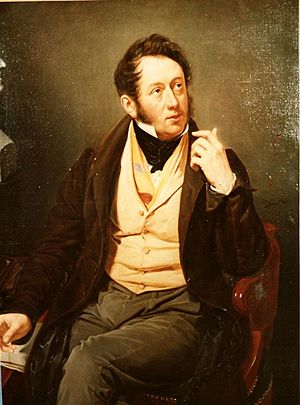Hippolyte Bis facts for kids
Quick facts for kids
Hippolyte Bis
|
|
|---|---|

Portrait of Hippolyte Bis, by Serrur, 1829
|
|
| Born | 29 August 1789 |
| Died | 3 March 1855 (aged 65) Paris
|
| Occupation | Playwright Librettist |
Hippolyte Louis Florent Bis (born August 29, 1789 – died March 3, 1855) was a French writer from the early 1800s. He was known for writing plays and opera stories. His most famous work is the story, or libretto, for Gioachino Rossini's famous opera William Tell. He wrote this with Étienne de Jouy.
Contents
Who Was Hippolyte Bis?
Hippolyte Bis was born in Douai, France, in 1789. He grew up to become a talented writer. He focused on creating stories for the stage. This included both plays for theaters and librettos for operas. A libretto is the text of an opera. It's like the script for a movie, but for a musical performance.
He lived and worked during a time of big changes in France. His writing helped shape the entertainment of his era. He passed away in Paris in 1855.
What Did Hippolyte Bis Write?
Hippolyte Bis wrote many different pieces for the stage. He was especially good at writing serious plays called tragedies. He also created stories for operas.
Famous Opera Stories
- William Tell (1829): This is Hippolyte Bis's most well-known work. He wrote the story for this four-act opera with Étienne de Jouy. The music was composed by the famous Rossini. The opera premiered in Paris on August 3, 1829. It tells the exciting story of William Tell, a legendary hero.
Plays for the Theatre
Hippolyte Bis wrote several plays that were performed in important French theaters. These plays were often tragedies. They explored serious themes and dramatic events.
- Lothaire (1817): This was a tragedy with three acts. He wrote it with François Hay.
- Attila (1822): This five-act tragedy was performed in Paris. It opened at the Second Théâtre-Français.
- Blanche d'Aquitaine, ou le Dernier des Carlovingiens (1827): This was another five-act tragedy. It was shown at the famous Théâtre-Français.
- Jeanne de Flandre, ou Régner à tout prix (1845): This tragedy was also performed by the Théâtre-Français.
 | Jessica Watkins |
 | Robert Henry Lawrence Jr. |
 | Mae Jemison |
 | Sian Proctor |
 | Guion Bluford |

